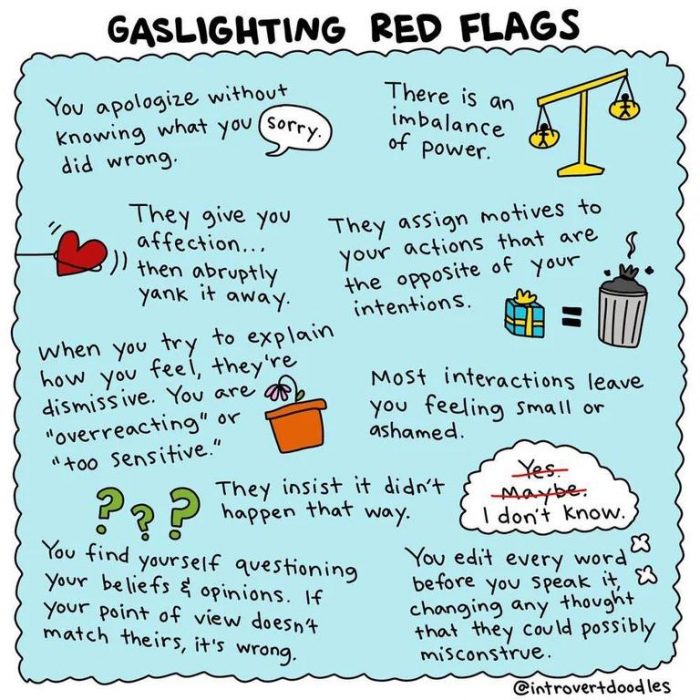
Gaslighting is a form of emotional abuse where the perpetrator tries to make the victim question their own perception of reality. It can happen in romantic relationships, but it also happens at work, with friends and family members, or within your social circle. The best way to protect yourself from gaslighting is to know the signs before they start happening. Here are some red flags that can help you recognize when someone is trying to manipulate your emotions:
When they deny they said something that they are definitely known to have said.
Sometimes, gaslighters will deny that they said something that you can prove they did. For example, if you tell them that you heard them say something about one of your friends and they say “That’s not what happened,” or “I never said that”–even though there is video evidence to the contrary–you might have a gaslighter on your hands. There are several ways in which someone might try to get away with this: They may tell you that their words were misunderstood or taken out of context; for example, if someone asks them about an argument between two people who both dislike each other very much (say, two coworkers), but then only reports back what one side said without mentioning the other person’s perspective at all–or even worse, twisting it around so it sounds like she was right all along! In these cases where there is no way around having heard exactly what was said (and even worse still if there are witnesses), try asking questions like: “What did he mean by x?” Or maybe even just saying outright “I don’t believe him/her.” Another common tactic is playing dumb; when confronted about something offensive or hurtful done by another person (who happens not only know better but has been doing this for years), some people will pretend ignorance as if nothing happened at all – thereby avoiding responsibility altogether while also avoiding any consequences associated with engaging in such behavior themselves
If the other person is always right, even when it’s wrong, and everything is your fault.
This is a classic sign of gaslighting. If the other person is always right, even when it’s wrong, and everything is your fault. The goal here is to make you feel like you have no control over your own life and that your partner has all of the power in the relationship. They want to keep you off balance so they can manipulate you into doing what they want or feeling bad about yourself because at least then they won’t be alone in their misery anymore! When someone tries to make another person doubt themselves on purpose like this–especially if they’re trying to convince them that their opinion doesn’t matter–it’s manipulation through psychological warfare tactics designed specifically for controlling behavior patterns within romantic relationships (and sometimes family members too).
When they use words like “crazy” or “insane” to describe you or your actions.
This is a red flag because it shows that the person is trying to make you feel like you are crazy or out of control. This can be done by using words like “insane” or “crazy,” which are meant to make you doubt your own sanity and question your actions. The goal here is for them to gain power over you by making it seem as though they have an upper hand on reality while also invalidating any feelings or thoughts that contradict their own narrative. If someone uses these kinds of words against you, take note: They might not understand what gaslighting actually means–or they may be trying very hard not only to manipulate others but also themselves!
When someone tries to keep the focus on you as much as possible and never admits fault, no matter what happens between the two of you.
If you’re in a relationship with someone who constantly tries to make the focus about you, and never admits fault, no matter what happens between the two of you, there’s a good chance they’re gaslighting. Here’s why: It’s not about you–it’s about them! They want to control you by making it seem like everything is your fault so that they can make themselves look better in comparison. They don’t care about your feelings or how much pain their behavior causes; all they care about is how much power over others’ emotions they have at any given moment (and this includes yours).
Gaslighting is a form of mental abuse
Gaslighting is a form of mental abuse in which the perpetrator seeks to convince their victim that they are going insane. The abuser may attempt to make the victim feel like they have memory problems, are paranoid, or even crazy. This can be done by withholding information that would prove otherwise; telling outright lies and then claiming that it was never said at all; using sarcasm or insults in place of rational arguments; saying something happened when it didn’t really happen at all (this is known as “projection”); etc. Gaslighting is often used as part of other forms of psychological abuse such as emotional blackmail or control over finances/personal property/access to friends/family members etc., so it’s important not only recognize when someone is gaslighting you but also get help from people who aren’t involved with your relationship!
Gaslighting is a form of mental abuse, and it can be very difficult to recognize. You may have been experiencing these red flags for some time before you realize what’s going on. If any of these signs sound familiar in your relationship or with someone else, consider talking with someone who can help you get out of the cycle of gaslighting once and for all!
